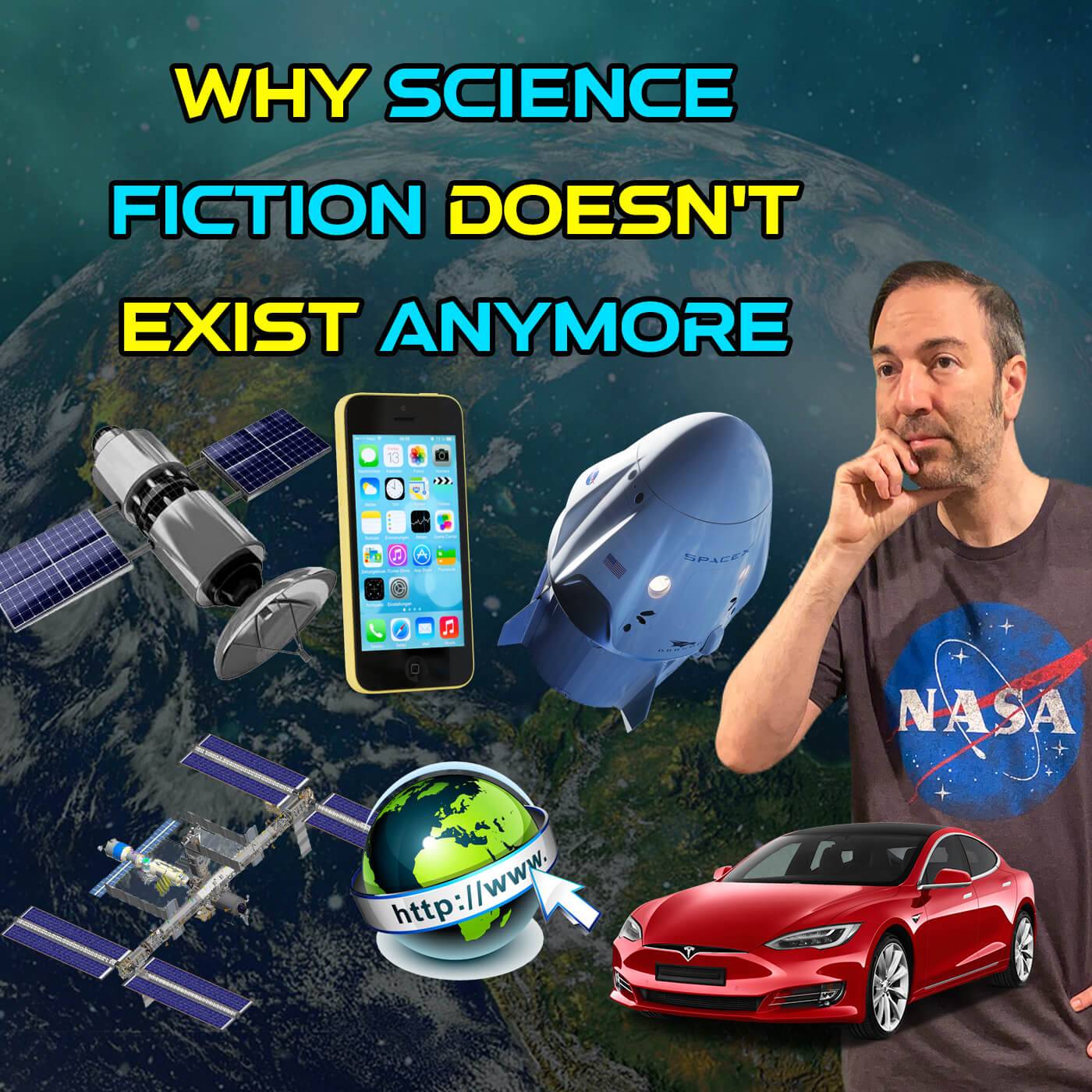Future Tech: Why Science Fiction doesn’t exist anymore

In this episode, I talk about why science fiction doesn’t exist anymore. The reason I say this is because for 100 to 200 years, authors have been writing science fiction stories, people like Jules Verne, Robert Heinlein, Isaac Asimov, and HG Wells with stories like “From the Earth to the Moon”, “Brave new world”, “1984”, “The time machine”, and so many other stories. In these classic tales, the authors predicted what they thought would happen in the future. The main reason why I say science fiction no longer exists, is because most if not all of those predictions have come true. We are living in a scifi world.
This episode is sponsored by the world’s first productivity shot, Magic Mind. Pick some up at magicmind.co/boots and use my code BOOTS to get 20% off your order or 40% off your subscription within the next 10 days!
Listen to the Podcast episode here:
Or Watch the Video here:
Here’s the transcript from this podcast episode, please excuse any typos!
Let’s just start off with the smartphone. I mean, a simple device that we take for granted can do everything. And in Star Trek, they had the communicators, right they were able to communicate off planet to the ship, the enterprise, and in a lot of other books and movies. There was always some sort of communication device. Well, sure, we had we had cell phones in the 90s, and even in the 60s 70s and 80s, some very primitive, mostly for big corporations and the military use, but eventually, the masses were consumers were able to get these smartphones and a smartphone isn’t just a phone, as we know, we can watch movies on it. We can pay our bills on it, we can order food on it, we can calculate really complicated data, formulas using sophisticated calculators. We can take pictures and take videos and we can do all these different things. Which has also opened up and yes we had this before smartphones but video chat. I mean, how many times do you know the old movies and the old shows? Twilight Zone, Star Trek, Star Wars, even where there were holographic video chats or screen type video chats, even in books. People were writing about video chat in the 1900s.
So are we saying that we’re sci fi? We do FaceTime video chats, we’re constantly talking on video through smartphones, and a lot of this technology and communication right? Communication is very important. Because if you go back 100 years, we were still using the telegraph and the telephone and everything was very slow. And before that it was even worse. We had to travel by boat to another country because the mail was very slow. So communication opened up and one of the biggest pieces of sci fi that became a reality was satellites, satellites in space again we take these for granted. But once we started putting satellites in space, we had the GPS or Global Positioning System, to allow us to be able to navigate better. It also allowed for communication because it’s able to transmit data and it’s also able to receive data. It’s all basically a way to communicate worldwide in an instant. And to just realize that we have this available to us. It’s mind blowing when you really think about the fact that there’s hundreds or 1000s of satellites circling the globe right now. As I talk to you, helping us use our smart, our smartphones, enabling the video chat to be able to go through networks. How did we get there? How did we do that? Probably the biggest part of science fiction books and movies was space travel and having a space station and having spaceships rather than having astronauts. Think about it for a second. Go back to the 1950s and 60s, the Cold War era when Russia and America were having a space race. Everybody was trying to get to the moon. Let’s get to space. Let’s get our people into low Earth orbit. And we did it. We landed people on the moon and we started to travel in space a lot. We had the space shuttle program. And now we have space x with reusable rockets. We’re going back to the moon with the Artemis program soon. We have the International Space Station.
So even if you look at Stanley Kubrick’s 1960s movie 2001 A Space Odyssey, his prediction and others as well because people have written about this many times in the past before that was there’s going to be a space station in space that we can work out of and we can live out of and in the 90s we launched the ISS, we have the space station. So doesn’t that mean that we’re actually living in the Sci Fi world? I think so. So all these books that people read in the 1800s-1900s you know from the journey from the Earth to the Moon you know, or different types of space travel movies and TV shows that came out that we didn’t have space travel. We didn’t have satellites, we didn’t have any of that. So they were just predicting that eventually we would have it. Well, eventually it is now and another thing that people talked about a lot in books or movies, specifically in 1984 was government surveillance. You know Big Brother is watching you. We have the CIA, NSA, FBI, all these government agencies are now watching us through camera technology once again, cameras everywhere. I mean, that’s a dystopian future. If you ask me when you have cameras everywhere, surveilling you. Watching you on your smartphones. And your webcams and your cameras listening through microphones. Sorry people, that’s sci-fi. That’s science fiction and we have to stop calling it that. I think it’s present fiction. We’re living this fiction now.
Brave New World was another great book and it came out almost 100 years ago where they were helping the residents of the community. Stay calm through medicine, right? The antidepressants for example. And nowadays we have a drug or a pill that helps you cure almost any ailment. Back in the day they were selling snake tonics, you know they were selling these tonics. Full of maybe even cocaine or syrups and different types of flavors and they didn’t do anything right. These medicines, medicines quote unquote medicines didn’t do anything. But now we have pills that can actually cure you know, diabetes you have insulin, heart disease and, and blood pressure. And cholesterol. There’s a pill to lower all these things and there’s just so many medicines nowadays to cure illnesses that in the past would have killed you by the time you were 20 years old. Now we can live till almost 100 And we’re getting to that point now with stem cell research CRISPR gene editing I mean, that was a sci-fi thing. It was editing the genes and being able to modify humans and being able to live longer and create organs. I mean, we’re getting closer to that part. I mean, CRISPR, the gene editing tool that we have, we’ve just unlocked the human genome and all of the strands of DNA have recently been unlocked. So we’re at the cusp of reaching that final piece of science fiction of living longer through medicine. I mean, we can’t ignore medical technology. Think about it this way. When you watched Star Wars or Star Trek or other space shows or movies, where they would send you to sickbay or the medical facility, and they had all these like X ray machines and MRIs and all sorts of cool gadgets and scanners and things like that. Now, back when these shows came out, we didn’t have a lot of that technology. But we do now. We have you know, when you go into the operating room and you go into the hospital and you go to the doctors, they have so many medical technologies, science fiction, guys, I mean, we’re living in it.
And there’s, then we have to look at more simplistic things right. There are quite a few things. If you think about, for example, one of my favorite books of all time, The Hitchhiker’s Guide to the Galaxy, right? They gave him a babel fish, which he sticks in his ear and it squirms around and all of a sudden he can understand every language, right, so it’s a translator. Well, don’t we have translators now, Google Translate, and now Microsoft through Skype has a live translation, which will translate like English to Spanish or Indian to English or whatever language to whatever language and it’s live. So you can talk to somebody. Even if you talk through Google translate on the live feature, you can show the person the screen or it’ll speak out loud. You can at this point, we can translate any language into any language. I believe I’ve seen the inventions of people having earpieces that you can hear someone hear someone’s voice through the phone and then it tells you what they’re saying. And maybe it works as a microphone through the earpiece that you can talk to and they can hear it in their earpiece. So you could talk back and forth. We’re getting really close to that live translation, and we already have it so babelfish we have a form of that. And then let’s look at the fact that every spaceship in most movies or shows or of course, they came from books, mostly. There was a computer that you would talk to the computer telling me the trajectory to the nearest star system and the computer would say, well, it is 1,426,000 light years away, sir. And the computer would talk to you as an assistant. No, okay, the computer plotted that trajectory. Let’s get on course for that planet. And the computer would start calculating and doing things right. And throughout history in science fiction, computers, on board of ships, or even on the ground on earth or other planets depicted in sci fi stories. The computer was an entity that would like an AI that would help you complete tasks. We have Siri. Siri helps me complete tasks. She sets calendar appointments for me and calls people for me and texts people for me and takes my dictations and answers formulas. If I have a formula I want an answer to she’ll answer it. And that goes without saying. Most computer databases on these ships or stories had the knowledge base of the whole universe. Well, don’t we have that? Don’t we have the internet? The internet you can type in any question and get an answer. Wikipedia has all knowledge of everything in this one database website. So don’t we have knowledge of the history of the world and the universe and assistance to help us along the way along with translation and satellites and smartphones and video chat? Let’s not forget about electric cars Hello People Tesla. Electric cars are now on the road. They’re self driving. That my friends is science fiction for electric cars. I mean, we’ve been talking about these things for a long time. A self-driving car. You see them in movies. I’ve seen them in movies a million times whether the self-driving car or electric cars we have. So now how can we make a sci fi quote unquote, movie?
With all of these things that I just talked about? You can’t you can’t write a story about this anymore. The next evolution in what is considered science fiction is going to have to be anything that has nothing to do with these things because these things are now part of our reality. It is reality fiction. So the next thing would have to be gene editing, creating organs, immortality or living long periods. Of Time by removing diseases, interstellar travel, traveling to other planets. This is really that’s the bread and butter of sci fi at this point. There’s really nothing left for us to explore because we’ve already created all of it. Potentially meeting extraterrestrials aliens that are science fiction of course, we’re still not at that point. So there’s still a couple of untapped stories. There are science fiction features that we can talk about in the future. But we’re living in sci fi now. And that’s why I think it doesn’t really exist anymore. I think there should be a new term for, you know, unknown fiction. What’s the unknown extraterrestrials? Will we ever meet them? Will we ever be able to create 3d printed organs? Will we be able to edit our genes to a way that we can evolve into a species that can breathe on Mars? These are the questions that are unknown. Maybe there’s a new term for this I don’t know but hopefully you guys enjoyed this episode. I really did. Because I realized that science fiction no longer existed in a way. So let me know what other pieces of technology I might have missed that fall into this category of sci-fi that is in reality, I’d love to hear it in the comments please. As always, I will see you in the next episode.
![]()






